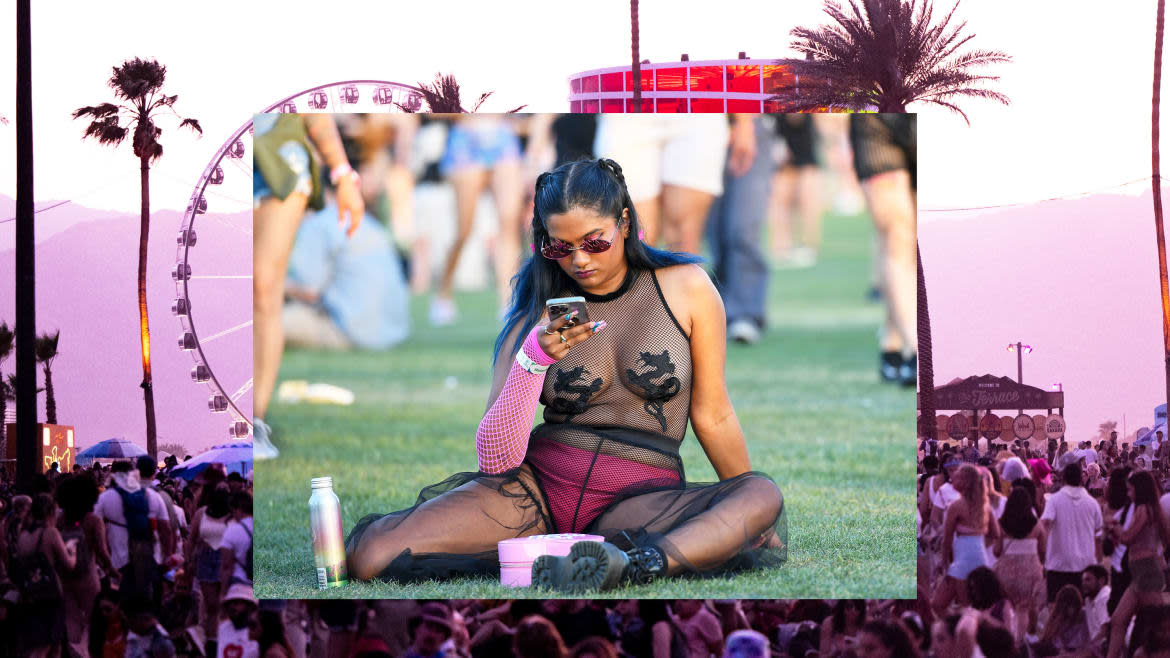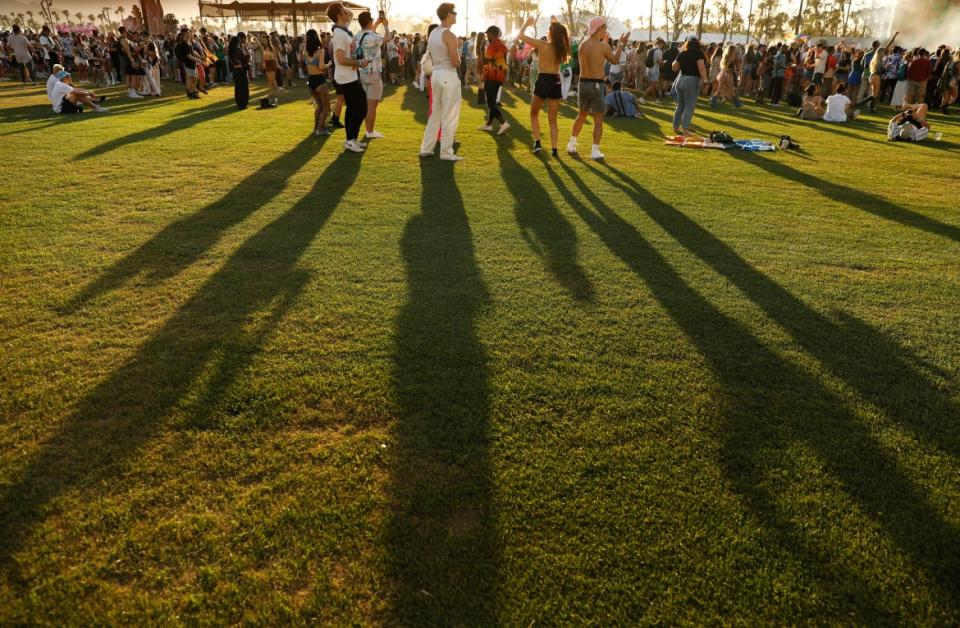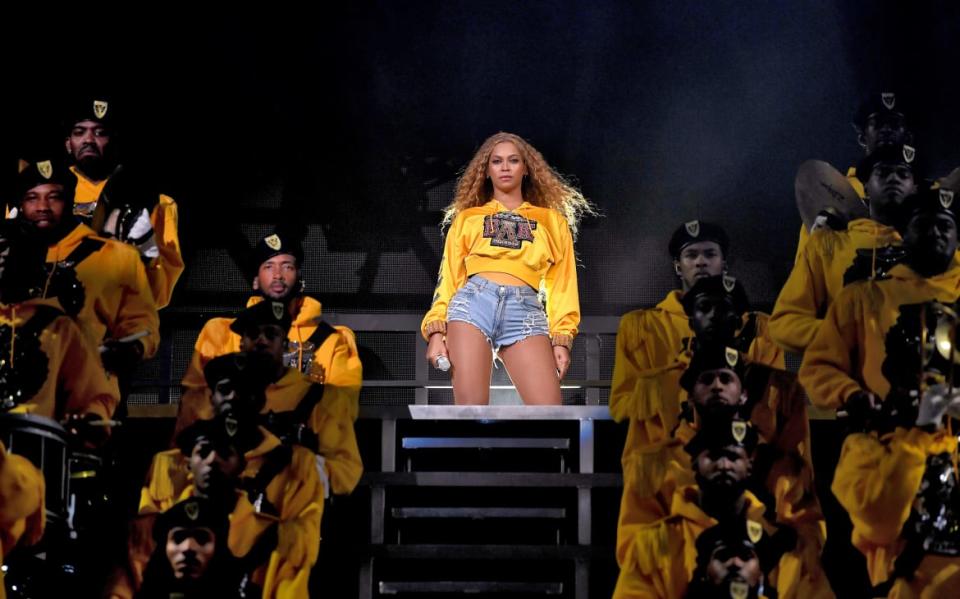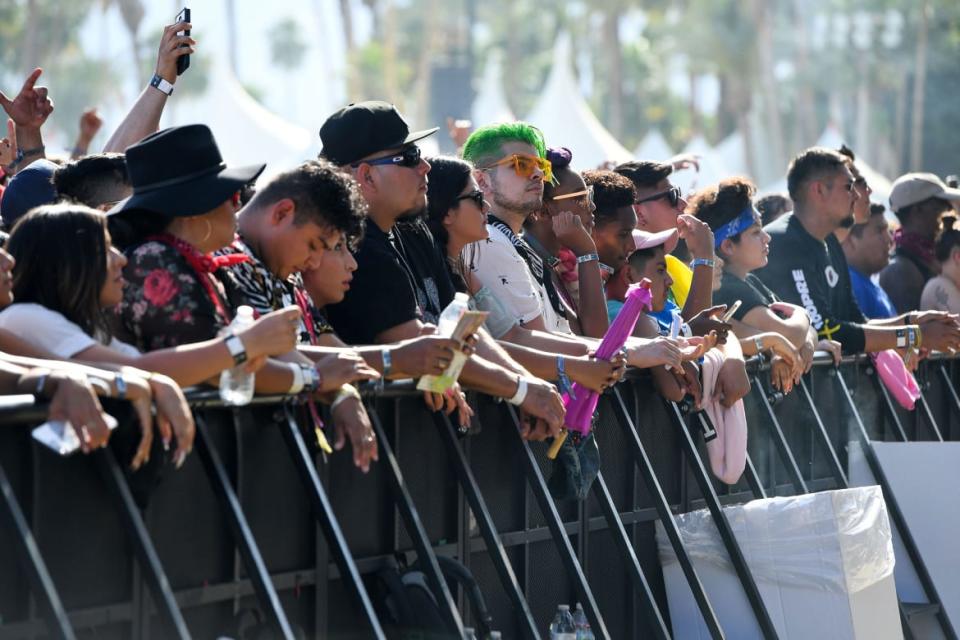Is This the End of Coachella?

The grumblings started early. It was just a few days into 2024, and music forums, subreddits, and Twitter replies to a benevolent insider going by the moniker of “Festive Owl” were crawling with angry Coachella fans. There was a time, they were eager to remind you, that Coachella’s lineup dropped in the first week of January. But last year, and now this year, the days passed in silence. Eventually, other festivals butted in: Boston Calling, Alabama’s Hangout Festival, Bonnaroo, and Governor’s Ball all unveiled their lineups in early January.
Even other festivals were pissed. Coachella holds embargoes on artist announcements, meaning other events that share artists with the California festival can’t announce their lineups until Coachella does. Resonate Suwannee, an EDM festival in Florida, delayed at least one artist announcement due to “the radius clause of a certain festival in California.”
This passive-aggressive callout incited panic among Coachella’s terminally online: What could be delaying the lineup announcement? Was Goldenvoice, the promoter behind the festival, scrambling to find a headliner? Maybe Coachella booked Taylor Swift, but she was forcing them to announce on the 13th, to celebrate her lucky number? Whatever it was, the well-oiled machine that used to deliver shiny, untouchable lineups had rusted.

Music fans at Coachella in 2023.
There are always the haters when a lineup gets announced. But when Coachella finally dropped on Jan. 17 (its latest release since 2013), the reaction was vitriolic. And for once, the ticket sales finally caught up with the fatigue that consumers felt. Countless entertainment outlets reported on it with schadenfreude: Coachella 2024 was not selling out. In 2023, the festival sold out within a week; this year, it took nearly a month for the first weekend of the two-weekend festival to do so.
For the first time in a decade, #Coachella sees the slowest sales as tickets for the first weekend are still available.
In previous years, they sold out within hours. pic.twitter.com/omNGoyMj4t— Buzzing Pop (@BuzzingPop) January 24, 2024
Despite reuniting No Doubt, a prestige legacy act, booking three popular headliners, and filling the lineup with a host of big-tent DJs, beloved indie bands, and exciting rising stars, things just aren’t working for Coachella like they used to. It begs the question: Why are people so mad at Coachella? And is the long-dominant music festival finally losing its luster?
Previously, the Coachella lineup had a certain cache. Year after year, the festival delivers more than just a weekend of music, drugs, and an ensuing hacking cough. Its draw was not Indio’s stunning desert scenery, nor its art installations, and certainly not the once-in-a-lifetime opportunity to glamp with three of your best friends at “Lake Eldorado” for upwards of $6,000. As much as Coachella has a reputation for attracting a crowd of influencers and celebrities, the vast majority of people who make the trek to the desert do it because something about that sunset-colored lineup poster called to them.
D.A.N.C.E
Register now for access to passes at https://t.co/qujCsdlTip. Presale begins Friday, 1/19 at 11am PT. pic.twitter.com/DlApQGXnBb— Coachella (@coachella) January 17, 2024
Coachella sells a unique cultural experience you’re not likely to find at any other major festival in America. Artists make their sets special, often bringing out surprise guests or debuting new material. From the big-font names to the little ones on that inscrutable lineup poster, Coachella promises you firsts, lasts, and most importantly, exclusives. In 2023, Boygenius’ closing slot at the Outdoor Tent was their first performance after releasing their debut album the record; mysterious and revered electronic artist Jai Paul made his live show debut; and Frank Ocean performed for the first time since 2017. In 2022, BROCKHAMPTON announced that their Coachella performance would be their last before breaking up; EDM megastars Swedish House Mafia celebrated the release of their first album with a headlining set; and Danny freakin’ Elfman performed “This Is Halloween.” And no other festival in America could have provided the necessary context for Beyoncé’s historic Homecoming set in 2018.

Beyoncé performs at Coachella in 2018.
If you have the means, Coachella justifies its steep price with lineups that are improbable, with a crown jewel A-lister or two holding court at the top. These headliners are, almost always, true superstars: Lady Gaga, Kendrick Lamar, Radiohead, Prince, Jay-Z, OutKast, Beyoncé… the list goes on. But realistically, artists like Beyoncé are, to use her word, unique. Especially after Beychella, headliners are expected to elevate their main stage performance into a global event—which only so many people can actually do. Increasingly, the festival can no longer live up to its reputation for iconic headliners.
That’s not for a lack of trying on Coachella’s part. According to a report from Billboard, Coachella tried to book a Talking Heads reunion this year, but the band declined. The usually reliable Twitter account Festive Owl said Coachella failed to lock Rihanna for 2023. Apparently, conversations between Goldenvoice and Shakira reportedly fell apart as well. There are a few white whales: Rihanna has never headlined, and neither has Swift, though her gap in tour dates this April raised a few eyebrows about whether this would finally be her year to grace the Indio stage (it’s not). And even when Coachella does score A-list names, they can be fickle. Kanye West was set to perform in 2022, but pulled out just two weeks before. Frank Ocean’s set last year was a production and publicity disaster; it’s unconfirmed if he canceled for weekend two, or was disinvited.
Frank Ocean Bails on Coachella, Leaving Fans With Blink-182
This year’s three headliners—Doja Cat, Lana Del Rey, and Tyler, the Creator —are reliable and professional performers who signal that this is a “re-build” year for the festival after four years of COVID cancellations and headliner drama. But why would someone pay upwards of $1,000 for artists who don’t have an exclusive draw? Doja Cat is in the midst of an arena tour that hit nearly every major market in the U.S. last year. Lana Del Rey has performed at a score of other, less expensive festivals in the last year. And Tyler, the Creator hosts his own festival in L.A., Camp Flag Gnaw, where he headlines every year. If Doja Cat is just going to perform her set from the Scarlet Tour—a safe bet, considering she’s still promoting that album and is resuming the tour in Europe this summer—why not watch it from home, in a much more comfortable “Couch-ella” setting?
The problem is more than the headliners. This year, the fest’s second-tier billings are full of artists with big names but sparse or unreliable tour histories. LUDMILLA has only toured in Brazil, Young Miko and Anyma have only been opening acts for larger tours, and despite Ice Spice’s near-ubiquity, she has never had her own headlining tour. The touring industry often designates between “hard” ticket sales—the number of tickets an artist can sell off their own headlining gig—and soft ticket sales—the number of tickets an artist can sell off a gig with other headliners, or as part of a festival. Obviously, hard ticket sales are a much more reliable metric to gauge an artist’s popularity. This year, Coachella relies on a lot of soft ticket sellers.
This isn’t to say those second-tier artists are not great, or that they’ll have bad sets. Coachella is an excellent space for newer artists to hone their live skills and build up a fanbase. But music fans don’t want to shell out $600 for top-line artists who haven’t established themselves as live acts, especially when they could pay $500 less to see them on tour later.

Fans at Coachella in 2019
If Coachella cannot provide lineups as enticing as in years past, then it has to get cheaper. This year, the cheapest “Tier 1” pass costs $499 plus fees. That doesn’t include any of the logistical costs, like camping passes or hotels, transportation, gear, camping supplies, and food (plus other Coachella essentials like glitter, hot outfits, and enough weed to ignore the constant presence of sand in your eyes). Other comparable U.S. festivals don’t rack up nearly the cost. Lollapalooza—which has four full days—cost $365 in 2023, and has the added benefits of being centrally located in Chicago and easily accessible via public transportation. New York City’s Governors Ball, the Bay Area’s Outside Lands, and Austin’s Austin City Limits are all roughly the same price with that shared transit convenience. Even Bonnaroo, another major camping festival in Tennessee, is cheaper, with a no-fees price of $435.
And now that Coachella live-streams its performances on YouTube for free, there aren’t enough compelling reasons to make the trek. Even for Los Angeles locals, it’s far. The festival grounds at Indio’s Empire Polo Club are three hours from LAX on a good traffic day (and returning over 100,000 tired, sand-crusted festival-goers to the City of the Angels is not a recipe for a good traffic day). There are countless other festivals in the Los Angeles area that are cheaper and easier to get to, including ones that cater to specific musical interests: Just Like Heaven appeals to the millennial indie crowd, BeachLife covers rock radio fans, Rolling Loud LA takes mainstream rap, and Skyline and Cruel World attract EDM-heads.
Ultimately, Coachella’s problems are the music industry’s problems. Despite an eclectic lineup, the festival’s slow ticket sales suggest an industry unable to provide an experience worth its exorbitant cost. The industry struggles to develop sustainable, long-term careers for new artists. Last year, pop music fans around the U.S. spent hours of time and ridiculous amounts of money to see Swift and Beyoncé’s stadium tours, an enthusiasm that isn’t shared with 99 percent of other artists or this music festival. No, this likely isn’t the “end” of Coachella. But it should be a reckoning for Goldenvoice, record labels, and the music business at large—if they can’t provide an enticing lineup for one of the country’s biggest and most popular festivals, does the music industry even know what its fans want? If they don’t, slow ticket sales aren’t their biggest problem.
But still I, and thousands of others, will trek to Coachella this April. Because unfortunately, the best music festival in the U.S. is still the best music festival in the U.S… even if it’s no longer the best version of itself. For the truly devoted, a weekend in the desert with your best friends is priceless. And perhaps Coachella knows that those who structure their year’s budget and vacation days around those two weekends will keep accepting whatever Goldenvoice offers them. The only question is, for how long?
Get the Daily Beast's biggest scoops and scandals delivered right to your inbox. Sign up now.
Stay informed and gain unlimited access to the Daily Beast's unmatched reporting. Subscribe now.

 Yahoo News
Yahoo News 
